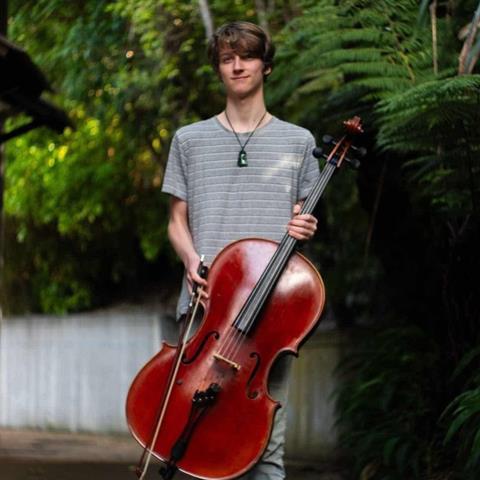’It’s nice to be part of a motivated community. Everyone is on a similar journey, albeit at different stages, and that gives you a lot of hope,’ says the cellist

I’ve lived in Wellington all my life, so the New Zealand School of Music was the ideal place for me to come after high school, especially because I knew lots of others coming both locally and from all around the country. The community is quite special here: it’s not the biggest music school but the people are really connected, so everyone knows each other and gets along really well. It was cool to be surrounded by like-minded musicians, which you don’t get so much at high school.
In the first year as an undergraduate you take all the music courses that are required – like performance, theory, and history – but from the second year onwards you can take electives, and there is so much more flexibility in that. I ended up taking quite a few, such as a film music history course and a German-language course from the university as well. You can choose from anything and decide if you want to do the minimum or loads extra, which is cool.
I’m studying with Inbal Megiddo, which has been great. She’s really observant and is good at figuring out what might be helpful, as well as cool and fun. She gives a lot of space to make sure that you’re doing things you want to be doing, as well as making sure you’re getting to the next level. We do lots of fun concerts – cello ensemble, a full opera with orchestra every other year, and now I’m into early music and get to play Baroque cello too!
My favourite part has been being able to broaden my sense of what’s out there – I especially enjoyed musicology – but it’s also just nice to be part of a motivated community. Everyone is on a similar journey, albeit at different stages, and that gives you a lot of hope. New Zealand is a little bit further away from the rest of the world, but it’s a beautiful place, and it’s nice to wander to the waterfront and sit on the beach at lunchtime. I’ve learnt so much and it’s a great place to be!
Subscribers to The Strad receive the 2025 Degrees supplement free with their copy of the May 2025 issue
Read: My experience: violist Kirsten Wilbrandt Kjær, Royal Danish Academy of Music Frederiksberg
Read: My experience: cellist Chris Njapa, University of Cape Town
The number one source for playing and teaching books, guides, CDs, calendars and back issues of the magazine.
In The Best of Technique you’ll discover the top playing tips of the world’s leading string players and teachers. It’s packed full of exercises for students, plus examples from the standard repertoire to show you how to integrate the technique into your playing.
The Strad’s Masterclass series brings together the finest string players with some of the greatest string works ever written. Always one of our most popular sections, Masterclass has been an invaluable aid to aspiring soloists, chamber musicians and string teachers since the 1990s.
The Canada Council of the Arts’ Musical Instrument Bank is 40 years old in 2025. This year’s calendar celebrates some its treasures, including four instruments by Antonio Stradivari and priceless works by Montagnana, Gagliano, Pressenda and David Tecchler.













































No comments yet